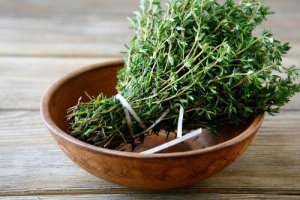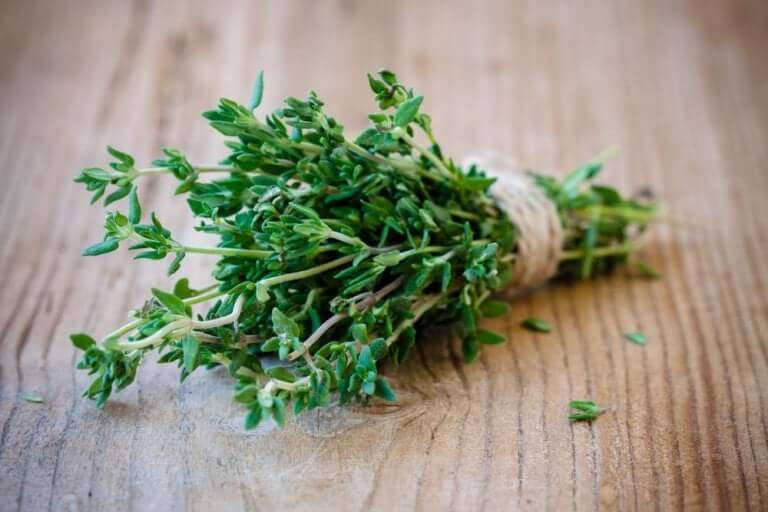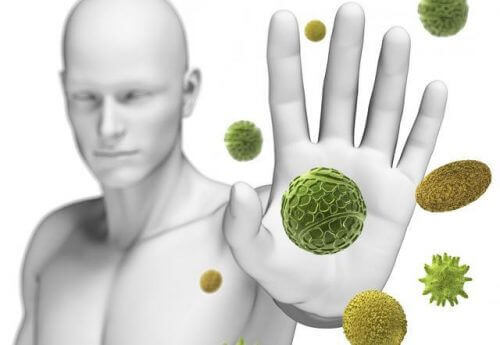Benefits and Properties of Thyme for Your Health

Thyme is one of the most popular medicinal plants. For hundreds of years, people have used it for its interesting benefits for human health. In fact, it really can help to prevent and treat some diseases. Also, because of its flavor, it’s great in Mediterranean food. Do you know the benefits and properties of thyme?
Although it’s a common herb to cook with, not many people know how it can help your body. Its components include essential oils, phenols and also flavonoids, known for their antioxidant properties. Additionally, it’s a source of vitamins and minerals. Let’s see some of its main benefits.
Benefits and properties of thyme

Thyme is an herb from the mint family. In fact, there are about 400 subspecies. Thanks to its characteristic flavor, it’s one of the most widely used herbs in the kitchen. Also, due to the benefits and properties of thyme, it’s popular in traditional medicine. Its components include:
Flavonoids and phenolic acids
First of all, you should know that thyme is rich in flavonoids and phenolic acids. These antioxidants reduce the damage that free radicals cause in the body. Also, its antioxidant power helps reduce the risk of heart disease.
Iron
Thyme is an excellent source of iron for your health. Keep in mind that iron helps transport oxygen, and helps make red blood cells. Because of this, it helps make new cells, hormones, and neurotransmitters.
Vitamin K
Another one of the benefits and properties of thyme is that it contains lots of vitamin K, and, therefore, it’s essential to make proteins that help blood clot.
Magnesium
A good number of thyme’s benefits are because of its magnesium, which regulates heart rate. A direct cause of this is that it ensures that the muscles and nerves work properly.
Vitamin C
Lastly, this plant is a good source of vitamin C. Therefore, it plays an important role in keeping your tissues, bones, cartilage, teeth, and gums healthy.
5 health benefits and properties of thyme
Since it has lots of essential nutrients, it’s not surprising that thyme has lots of health benefits and properties. In fact, many of its extracts are included in supplements and remedies.
1. Strengthens the immune system

Because of its antioxidants, including vitamin C, thyme is a really great ally to improve the functions of the immune system. In addition, it has antimicrobial and antiseptic effects. These help with viruses and bacteria.
Some research shows that thyme is effective against respiratory tract infections and coughs. It’s common in herbal teas to help fight colds. In addition, you can gargle it to help oral infections and sore throats.
You might be interested: Protect Your Respiratory System with this Oregano and Olive Oil Remedy
2. Benefits and properties of thyme: it’s an antioxidant
Lots of the benefits and properties of thyme are because of its antioxidant power. It stimulates the whole body, from the digestive system to the muscles. It can strengthen the immune system, and fight the damage caused by free radicals. These are reactive molecules that are involved in the appearance of certain cancers and diseases related to aging.
3. It’s good for digestion

Thyme is a plant that stimulates your appetite. Also, it relieves discomfort in gastrointestinal disorders. The phenols in this plant make it antispasmodic. Because of this, it can treat slow digestion, bloating and belching. In addition, it relieves intestinal cramps.
Check this out: Five Herbs that You Can Prepare to Treat Hypertension
Its anti-fungal and anti-microbial properties can also keep intestinal flora under control. For urinary tract infections, thyme tea helps fight cystitis, urethritis or prostatitis.
4. A source of essential minerals
There are so many great benefits of thyme for your health. Thyme is a great source of iron, which is essential to move oxygen around your body and form red blood cells. Also, it has lots of vitamin K, necessary for blood to clot.
Thyme has lots of manganese. In fact, this helps with lots of metabolic processes. Additionally, it has calcium to help form bones and teeth, as well as maintaining your overall health.
5. Benefits and properties of thyme for beauty

Lastly, you should know that, thanks to its antiseptic and healing properties, thyme fights skin infections, fungal infections, wounds, herpes, and lots of skin conditions. Also, it soothes redness, sunburns, and small wounds.
Thyme is common in oral and dental care since it heals your teeth and gums, as well as keeping them healthy. In addition, it fights bad breath and cavities.
Did you know these benefits and properties of thyme? Due to its flavor and properties, it’s worth adding into your regular diet. However, if you’re taking any medication or have a special condition, talk to your doctor about consuming it. Sometimes, it can react with medications.
All cited sources were thoroughly reviewed by our team to ensure their quality, reliability, currency, and validity. The bibliography of this article was considered reliable and of academic or scientific accuracy.
- Gruenwald, J., Graubaum, H.-J., & Busch, R. (2005). Efficacy and tolerability of a fixed combination of thyme and primrose root in patients with acute bronchitis. A double-blind, randomized, placebo-controlled clinical trial. Arzneimittel-Forschung. https://doi.org/10.1055/s-0031-1296916
- Stahl-Biskup, E., & Venskutonis, R. P. (2012). Thyme. In Handbook of Herbs and Spices: Second Edition. https://doi.org/10.1533/9780857095671.499
- Šegvić Klarić, M., Kosalec, I., Mastelić, J., Piecková, E., & Pepeljnak, S. (2007). Antifungal activity of thyme (Thymus vulgaris L.) essential oil and thymol against moulds from damp dwellings. Letters in Applied Microbiology. https://doi.org/10.1111/j.1472-765X.2006.02032.x
- Gallego, M. G., Gordon, M. H., Segovia, F. J., Skowyra, M., & Almajano, M. P. (2013). Antioxidant properties of three aromatic herbs (rosemary, thyme and lavender) in oil-in-water emulsions. JAOCS, Journal of the American Oil Chemists’ Society. https://doi.org/10.1007/s11746-013-2303-3
- Imelouane, B., Amhamdi, H., Wathelet, J. P., Ankit, M., Khedid, K., & El Bachiri, A. (2009). Chemical composition and antimicrobial activity of essential oil of thyme (Thymus vulgaris) from eastern Morocco. International Journal of Agriculture and Biology. https://doi.org/hdl.handle.net/2268/16021
This text is provided for informational purposes only and does not replace consultation with a professional. If in doubt, consult your specialist.








